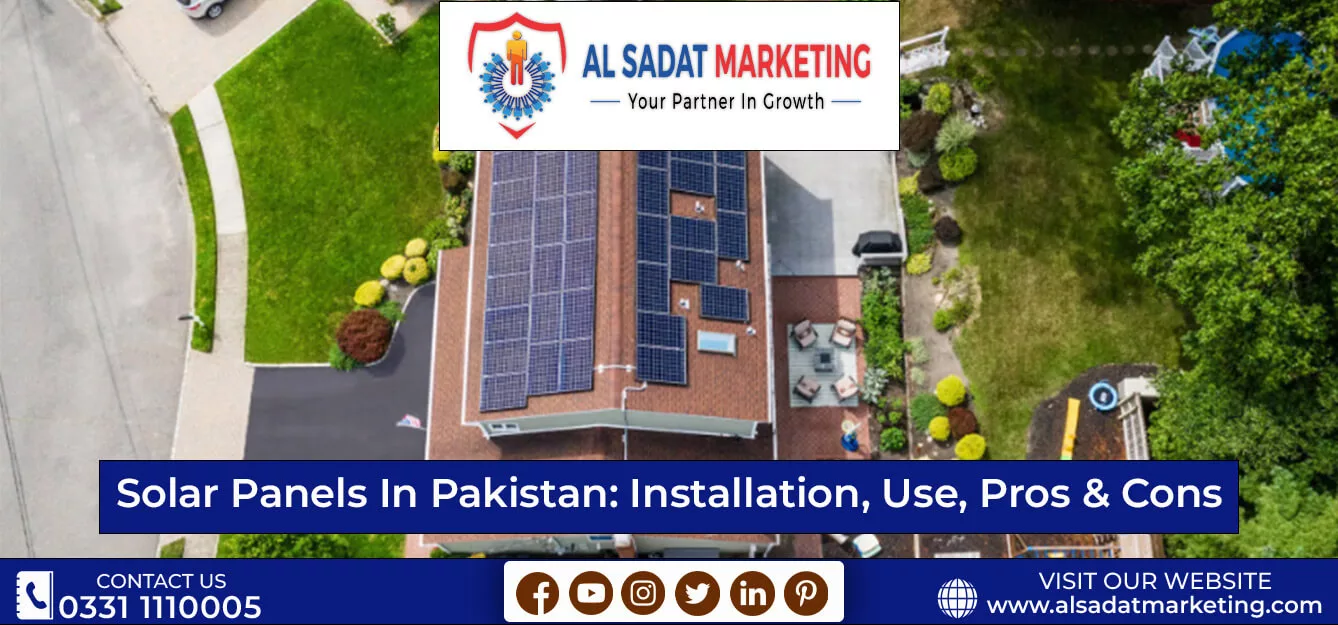Solar Panels in Pakistan: Advantages and Disadvantages
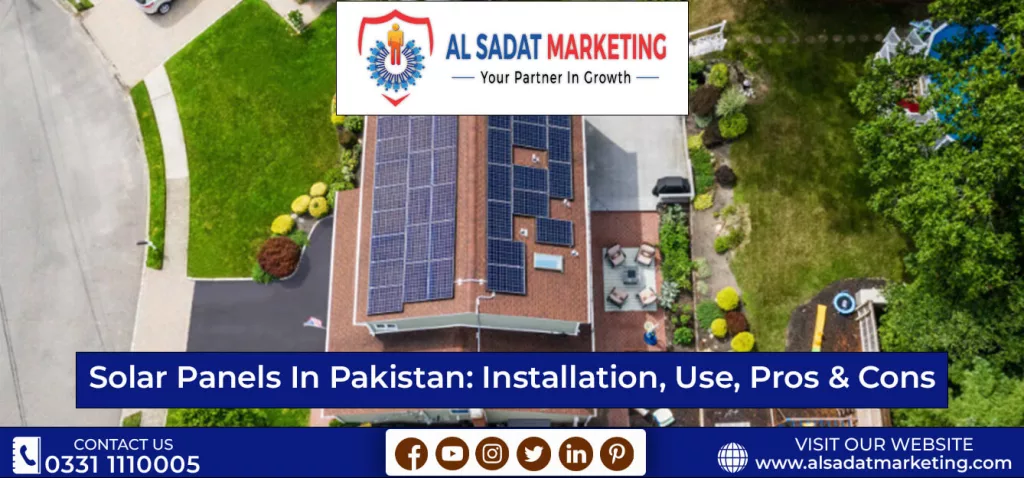
More people are now embracing the concept of having solar panel systems installed for their homes, offices, schools, or industrial & commercial buildings as the price of solar panels has decreased significantly.
As a result of recent advancements in the solar business and the high manufacturing quality of the panels, more and more individuals are deciding to use solar energy as their primary source of renewable electric power.
It is incredible how the human mind has developed a mechanism to utilize a supply of energy, namely the sunshine, which is constant and unlikely to run out anytime soon. So how exactly can a solar electric system illuminate your houses, businesses, or other types of commercial and industrial buildings?
In this blog, we’ll go through in depth how installing a solar system generates electricity and how the panels might benefit you.
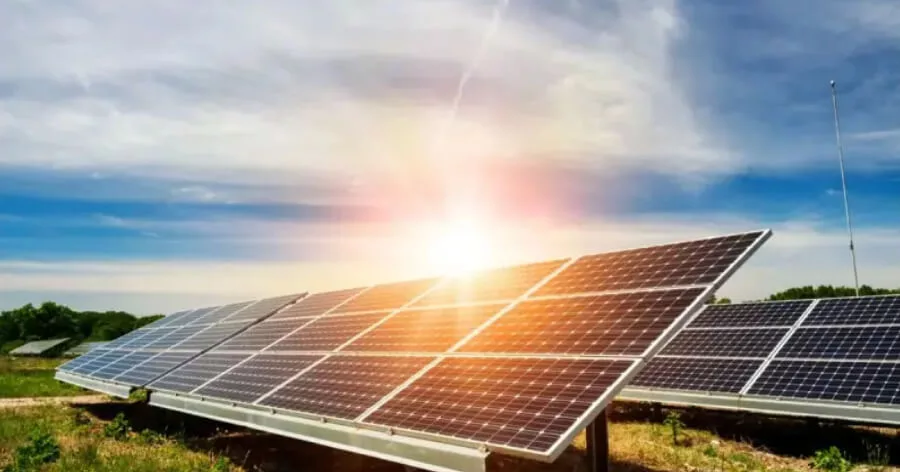
How Solar Panels Work?
Solar panels, also known as photovoltaic solar cells, make up the solar system that are installed for your house, business, or educational facility (usually manufactured from silicon). These cells take in solar energy and transform it into direct current (DC) output.
Charge controllers that employ DC power can then use this current to power appliances. If not, a linked inverter converts DC to AC (Alternating Current). The energy for all the linked appliances is then provided by this AC output as it travels via the electric wire systems.
In simple words, solar panels function by allowing photons, or light rays, to liberate electrons from their atoms and produce a charge. Power begins to flow once it is connected to an external load.
A solar panel is made up of numerous smaller photovoltaic cell modules. A photovoltaic cell is comprised of silicon-based semi-conductor material that has been doped with either phosphorous or boron to produce a positive or negative charge. A photovoltaic cell is created by sandwiching two layers of silicon that have opposing charges together. Between the layers of silicon, this produces an electric field.
When enough photons (sunlight particles) hit the solar cell, they produce photon energy that separates electrons from their atoms. The front surface of the cell is where these electrons next move.
An imbalance of charge between the front and the back of the cell develops when enough electrons migrate towards the front, creating a voltage potential similar to that found in the negative and positive terminals of a battery. Electric current starts to flow when these surfaces are coupled to an external load.
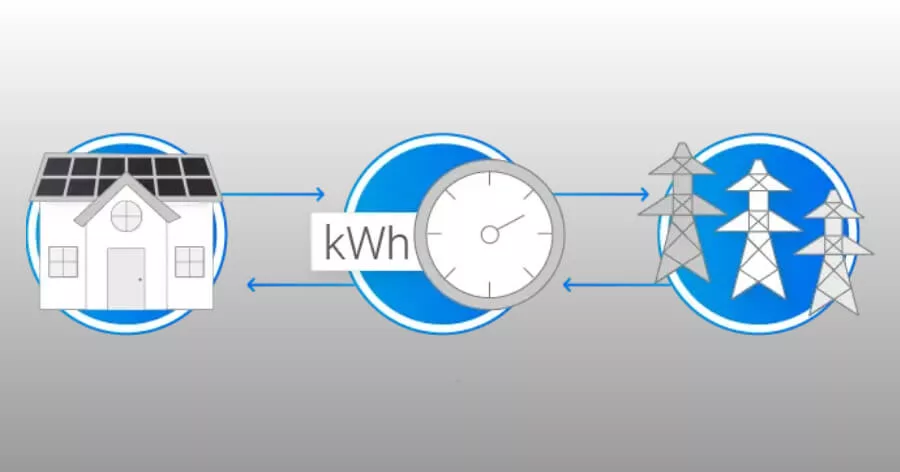
Advantages and Disadvantages of Solar Panels
Did you know that the sun can supply all of the world’s energy requirements for one year with just one hour’s worth of energy? The sun is unquestionably a potent energy source, and even though we can only capture a small portion of it, harnessing this power by putting up solar panels can have a big impact on the globe.
Solar energy has faced a lot of criticism for being too expensive or ineffective, but it has since shown to be quite advantageous, both for the environment and the private economy.
Solar energy is now the primary source of electricity for an increasing number of families, thanks to readily available solar panel incentives and the market’s fiercely competitive rates.
As a result of recent considerable advancements in technology and the addition of solar battery storage devices, solar energy is now a significantly more effective source of clean energy.
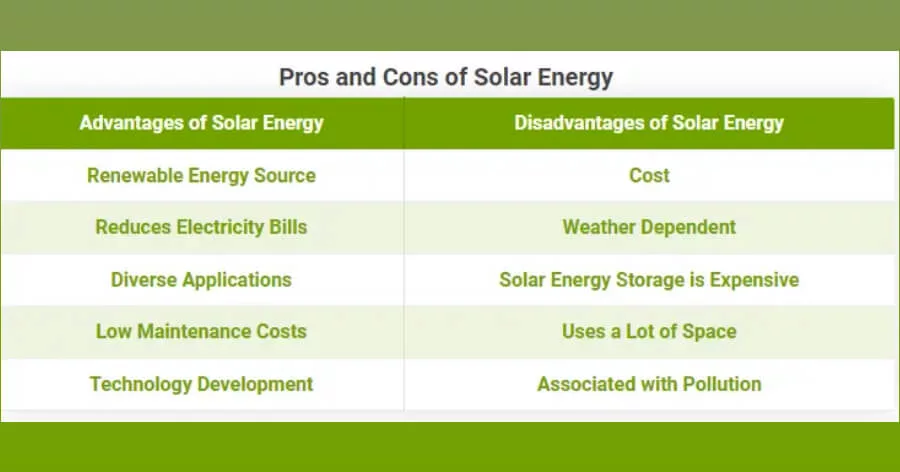
Advantages
Following are the advantages of installing solar panels in your home, office or industry:
Reduced Electricity Bills
Installing solar panels in your home will help you meet your energy needs through the electricity these solar panels will generate. This will significantly drop your electricity bill as you will be consuming the energy units from these solar panels instead of using units directly from wapda.
The reduction in your electricity bill will depend upon your usage of electricity and the size of solar panels installed in your home. For example, if you have installed commercial solar panels for your office, they will be considerably larger in size and will give you huge benefits by covering larger chunks of your electricity bills.
If your solar panel is connected to the grid, and you are producing more energy than you are consuming, you will be returning this surplus energy back to the grid. Doing this will benefit you as you will be receiving payments for this surplus energy. Hence, it is a win-win situation.
Renewable Energy Source
The fact that solar energy is a completely renewable energy source is the most significant advantage of solar panels among all its other advantages. It is available every day and can be used everywhere in the world. Unlike some other energy sources, solar energy will never run out.
We will be able to access solar energy for as long as there is a sun, which means that we will have at least 5 billion years until the sun dies, as predicted by experts.
Low Cost of Maintenance
Once you have installed these solar energy panels, they won’t require frequent maintenance. They only need to be kept moderately clean, so a few times a year of cleaning will do. You may always rely on specialized cleaning agencies in a reasonable amount.
Manufacturers of reliable solar panels typically provide a 20–25 year warranty.
Additionally, there is no wear and tear because there are no moving parts. Because it is constantly converting solar energy into power and heat, the inverter is typically the sole component that needs to be replaced after 5 to 10 years (solar PV vs. solar thermal). To guarantee that your solar power system operates as efficiently as possible, maintenance is required for the cables in addition to the inverter.
Additional Benefits
Apart from the above mentioned advantages, some of the additional benefits of solar panels include:
- Reduced reliance on foreign oil and fossil resources because solar electricity emits no pollution or greenhouse emissions after installation.
- Installable almost anyplace, from a field to a building.
- Batteries can be used to store extra energy for use at night.
- Solar energy can be utilized to power buildings, residences, and even automobiles.
- More secure than conventional electric current.
Disadvantages
Following are the disadvantages of solar panels:
Initial Installation Cost
Buying a solar system requires a significant up-front expense. This covers the cost of the wiring, installation, batteries, inverter, and solar panels. However, as solar technology is always improving, it is reasonable to predict that costs will decrease in the future
Weather Dependent
Even while solar energy can still be captured on overcast and wet days, the solar system’s effectiveness is reduced. Sunlight is necessary for solar panels to efficiently collect solar energy. As a result, a few days of overcast, wet weather can significantly affect the energy grid. Additionally, keep in mind that solar energy cannot be captured at night.
On the other hand, thermodynamic panels are an option to take into consideration if you also need your water heating solution to operate at night or during the winter.
Solar Energy Storage is Expensive
Solar energy must be used immediately unless it is stored in huge batteries. Off-grid solar systems that use these batteries can be charged throughout the day to utilize the energy at night. Although it is rather pricey, this is a fantastic option for using solar energy continuously.
Most of the time, it makes more sense to only utilize solar power during the day and use grid power at night (you can only do this if your system is connected to the grid). Fortunately, since your energy needs are often higher during the day, solar energy can help you fulfill the majority of them.
Additional Disadvantages
Apart from the above mentioned cons, some other disadvantages of relying on solar energy include:
- Requires a lot of area.
- Due to the lack of solar power at night, a sizable battery bank is required.
- The cost of devices that directly use DC power is higher.
- The size of the solar panels varies depending on the location to produce the same amount of power.
- Days with clouds don’t generate as much energy.
Things to Consider Before Installing Solar Panels
There are few questions that you should ask yourself before installing solar panels in your home or office:
- Would the location of your home allow for good southern exposure for solar panels?
- Are there any high-rise buildings nearby that could shade the solar panels and obstruct the sun’s light?
- Are there any large trees nearby that could shade the panels from sunlight and fling leaves and other debris at them?
- Would your roof’s layout allow for the most possible sun exposure? While most flat roofs can readily accept these photovoltaic panels, it may be challenging to install solar panels on roofs that are steeper than 60 degrees, it is vital to keep in mind.
If you have satisfactory answers to the above questions, you are good to go.
Conclusion
A home solar system kit should only be purchased from authorized suppliers, so make sure you do your research. Additionally, be sure to verify if they are licensed to perform such installations. The warranty is the same. Just because the seller was giving a longer warranty period doesn’t mean you should purchase inferior solar panels and inverters.
In general, solar energy providers provide warranties of up to 25 years for the panels and up to 5 years for the inverter. It seems sense that you would search for affordable solutions when selecting a solar system for your home. Avoid, though, solar panels that are absurdly inexpensive or used. Instead, search for goods that will offer the best return on your investment.
You can also invest in other famous and most in demand housing societies, such as , Blue World City, Rudn Enclave, 7 Wonders City Peshawar, Taj Residencia, Kingdom Valley, New Metro City Gujar Khan, Forest Town Rawalpindi, University Town Rawalpindi, ICHS Town, Park View City Islamabad, Multi Gardens B17 Islamabad and Nova City Islamabad.
Al Sadat Marketing please contact 0331 1110005 or visit https://alsadatmarketing.com/
Few more real estate housing schemes which are trending now a days in Islamabad by including: Faisal Town Phase 2, Prism Town Gujar Khan, New City Paradise, Eighteen Islamabad, 7 Wonders City Islamabad, Capital Smart City, Silver City Islamabad, The Life Residencia, Faisal Town Islamabad, Islamabad Golf City, Islamabad Model Town and Marble Arch Enclave.
Al Sadat Marketing is an emerging Real Estate Agency headquartered in Islamabad, Pakistan. With over 10+ Years of experience, Al Sadat Marketing is providing its services and dealing all trending housing societies projects in different cities of Pakistan. Islamabad Projects, Rawalpindi Projects, Gujar Khan Projects, Burhan Projects, and Peshawar Projects etc.
Book Your Plot Now: +92 331 111 0005


